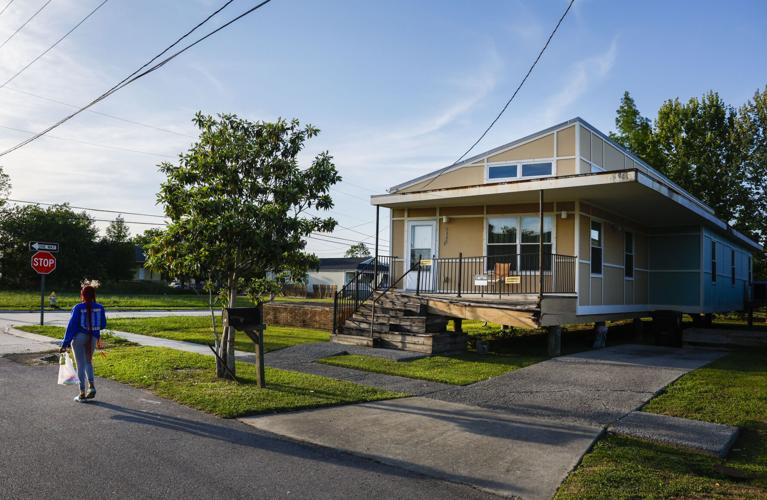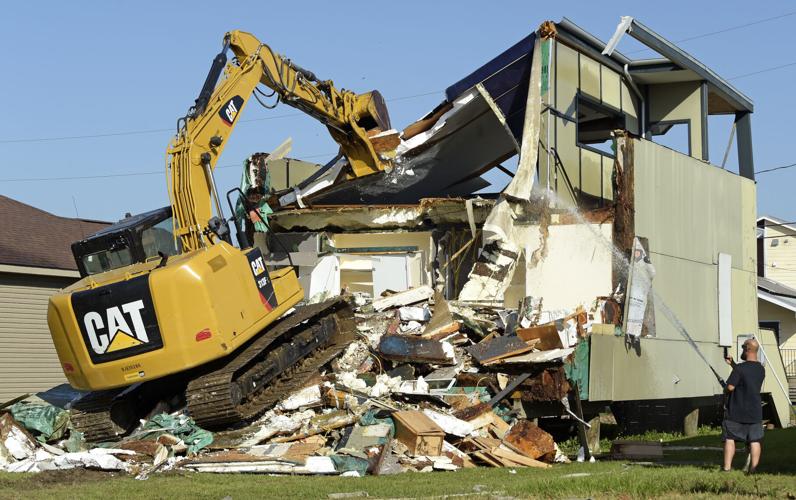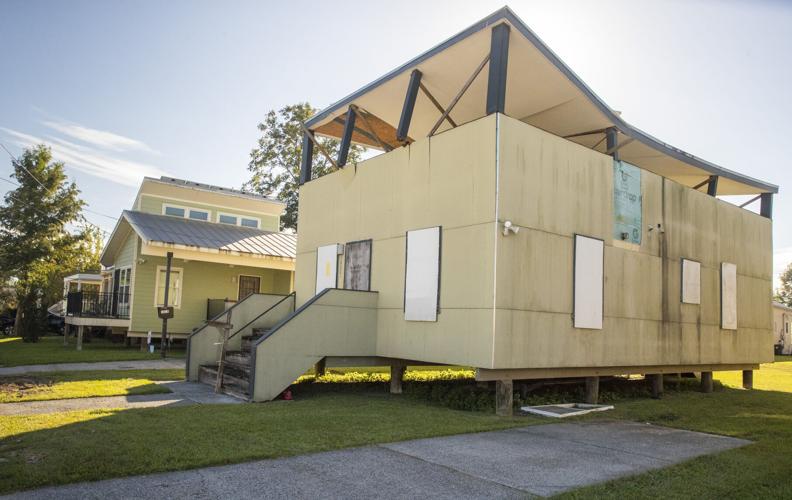In August 2022, it seemed that long-awaited relief would finally come for the residents of Brad Pitt’s Make It Right development in the Lower Ninth Ward. After four years of courtroom wrangling, the owners of the flawed homes, built by the Hollywood star’s nonprofit organization, were to be compensated for the shoddy construction.
Make It Right agreed to pay $20.5 million, to be divided among 107 eligible homeowners. Global Green, a Los Angeles-based nonprofit environmental organization, offered to pick up the tab.
But, according to Orleans Parish Civil District Court documents, Global Green didn’t come through.

Brad Pitt, founder of the Make It Right recovery neighborhood in New Orleans' Lower 9th Ward.
Unable to Make It Right
In a November 2022 memo to the court, Global Green CEO William Bridge explained that, although Global Green agreed to provide the funds within 10 days, the organization didn’t actually have the money to back up its pledge.
According to Bridge, the plan was to begin seeking donations from philanthropists.
“Global Green made it clear from the beginning,” Bridge wrote to the court, “that raising this large sum of money would require adequate time to identify and secure individual and corporate donors.”
Bridge told the court that in the face of the nonprofit’s inability to pay, both the chairman of the Global Green board and the organization’s New Orleans lawyer had resigned.
Bridge told the court that Global Green had become a “scapegoat,” but that it nonetheless “remains committed to raising the funds needed to resolve the dispute...”

The umbrella roof of the vacant two-story Make It Right house at 1826 Reynes St. in the Lower 9th Ward sags on broken supports atop the abandoned building. The building, pictured here on Wednesday, Oct. 7, 2020, was scheduled for emergency demolition by the city.
Looking for trouble
Why Global Green got involved in the costly and humiliating culmination of Pitt’s flawed development remains a mystery.
In 2006, Pitt lent his celebrity to Global Green’s plan to build a cluster of eco-friendly homes in the Holy Cross neighborhood of the Lower Ninth Ward. The homes had been flooded by a levee failure during Hurricane Katrina in 2005.
But by 2008, Pitt had struck out on his own, founding Make It Right, an alternative to Global Green, with a similar goal of building affordable, futuristic homes in the Ninth Ward to replace those lost in the catastrophe.
Anonymous benefactors
In a telephone conversation on Friday, Bridge was optimistic that Global Green would come through with the cash in the end. He said that his organization’s interest in Make It Right’s troubles was purely to benefit the beleaguered residents. Providing assistance to homeowners “was long overdue,” he said.
Bridge said that “there was a person who was going to cover” the $20.5 million owed the MIR residents, but that person – whom he declined to name – had backed off.
But, he said, another anonymous philanthropist had stepped up since then.
Bridge said that a New Orleans resident with “old money, who cares for the community,” plans to provide a surety bond that will guarantee to pay the millions in compensation to Make It Right homeowners, should Global Green fail to raise the funds on its own.
Bridge said he expects to announce that the surety bond is in place by Earth Day (April 22) and that he hopes to have begun renovations on at least 10 of the most deteriorated homes by the end of 2023.
According to the nonprofit rating website GuideStar, Global Green has $5 million in assets.

Actor Brad Pitt and 9th Ward resident Janice Porter at the site of the future Make It Right neighborhood in early 2008 (Photo by Doug MacCash, NOLA.com | The Times-Picayune)
Pitt too busy?
Ron Austin, the New Orleans attorney who represented homeowners in their lawsuit against Make It Right, sent a letter to his clients on March 24, making them aware of the situation.
In the letter, Austin said that Global Green “has attempted over the last few months to obtain Mr. Pitt’s continued cooperation in lending his name, likeness and image to Global Green’s fundraising efforts.”
But, the letter stated, in a March 13 court hearing that Pitt attended via video, the superstar “stated that he was essentially too busy to participate in any fundraising efforts...”
Austin said he intends to “proceed full force with litigation.”
Homeowner Tresea Ricks said she has not yet been notified that the seemingly settled lawsuit is once again in a holding pattern. Her Make it Right home, which was among the first built, isn’t in bad condition, she said, so she’s not counting on a large payment for repairs.
But, Ricks said, her nephew’s house is currently unlivable. So, for him, an infusion of repair money is crucial.
Ricks said she’s not entirely surprised that the payments have gone off the track. “They painted a good picture,” she said, “but when it was time to do something, I didn’t see anything come forth.”

Homes built by Brad Pitt's Make It Right Foundation are seen in the Lower 9th Ward neighborhood in New Orleans, La. Wednesday, June 1, 2022. (Photo by Max Becherer, NOLA.com, The Times-Picayune | The New Orleans Advocate)
Once upon a time
The fate of Make It Right is a recovery-era fable. A Hollywood leading man of unparalleled popularity devoted himself to replacing a devastated New Orleans neighborhood with a futuristic utopia. Some of the world’s best-known architects provided avant-garde residential concepts, and donors large and small supported the project to the tune of almost $27 million.
Audaciously designed homes rose, affordable loans were made, displaced residents were resettled, and tourists beheld the apparent triumph.
But there were problems. Presumably waterproof wood rotted prematurely, some roofs leaked, mold appeared, and residents found it increasingly difficult to communicate with the Make It Right management. Many of the houses remained sound, but a handful became as unlivable as the flooded homes they replaced.
Ten years after the project began, residents collectively sued Make It Right for damages, Make It Right sued its architect, and the project, which had once been the province of dreamers, was inherited by lawyers.
Ron Austin's office did not respond to request for comment.
When Ryne Hancock, a bicycle deliveryman, finds himself pedaling in the shadow of the 530-foot Plaza Tower in downtown New Orleans, he gets worried.







